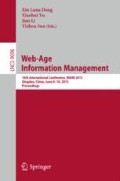Abstract
In mobile Internet, popular Location-Based Services (LBSs) recommend Point-of-Interest (POI) data according to physical positions of smartphone users. However, untrusted LBS providers can violate location privacy by analyzing user requests semantically. Therefore, this paper aims at protecting user privacy in location-based applications by evaluating disclosure risks on sensitive location semantics. First, we introduce a novel method to model location semantics for user privacy using Bayesian inference and demonstrate details of computing the semantic privacy metric. Next, we design a cloaking region construction algorithm against the leakage of sensitive location semantics. Finally, a series of experiments evaluate this solution’s performance to show its availability.
Access this chapter
Tax calculation will be finalised at checkout
Purchases are for personal use only
Preview
Unable to display preview. Download preview PDF.
References
Lee, B., Oh, J., Yu, H., Kim, J.: Protecting location privacy using location semantics. In: Apté, C., Ghosh, J., Smyth, P. (eds.) KDD, pp. 1289–1297. ACM (2011)
Mokbel, M.F., Chow, C.Y., Aref, W.G.: The new casper: query processing for location services without compromising privacy. In: Dayal, U., Whang, K.Y., Lomet, D.B., Alonso, G., Lohman, G.M., Kersten, M.L., Cha, S.K., Kim, Y.K. (eds.) VLDB, pp. 763–774. ACM (2006)
Sweeney, L.: k-anonymity: A model for protecting privacy. International Journal of Uncertainty, Fuzziness and Knowledge-Based Systems 10(5), 557–570 (2002)
Machanavajjhala, A., Gehrke, J., Kifer, D., Venkitasubramaniam, M.: l-diversity: privacy beyond k-anonymity. In: Liu, L., Reuter, A., Whang, K.Y., Zhang, J. (eds.) ICDE, p. 24. IEEE Computer Society (2006)
Mokbel, M.F., Alarabi, L., Bao, J., Eldawy, A., Magdy, A., Sarwat, M., Waytas, E., Yackel, S.: MNTG: an extensible web-based traffic generator. In: Nascimento, M.A., Sellis, T., Cheng, R., Sander, J., Zheng, Y., Kriegel, H.-P., Renz, M., Sengstock, C. (eds.) SSTD 2013. LNCS, vol. 8098, pp. 38–55. Springer, Heidelberg (2013)
Sweeney, L.: Achieving k-anonymity privacy protection using generalization and suppression. International Journal of Uncertainty, Fuzziness and Knowledge-Based Systems 10(5), 571–588 (2002)
Li, N., Li, T., Venkatasubramanian, S.: t-closeness: Privacy beyond k-anonymity and l-diversity. In: Chirkova, R., Dogac, A., Özsu, M.T., Sellis, T.K. (eds.) ICDE, pp. 106–115. IEEE (2007)
Wernke, M., Skvortsov, P., Dürr, F., Rothermel, K.: A classification of location privacy attacks and approaches. Personal and Ubiquitous Computing 18(1), 163–175 (2014)
Papadopoulos, S., Bakiras, S., Papadias, D.: Nearest neighbor search with strong location privacy. PVLDB 3(1), 619–629 (2010)
Paulet, R., Kaosar, M.G., Yi, X., Bertino, E.: Privacy-preserving and content-protecting location based queries. IEEE Trans. Knowl. Data Eng. 26(5), 1200–1210 (2014)
Gruteser, M., Grunwald, D.: Anonymous usage of location-based services through spatial and temporal cloaking. In: Siewiorek, D.P. (ed.) MobiSys. USENIX (2003)
Gedik, B., Liu, L.: Protecting location privacy with personalized k-anonymity: Architecture and algorithms. IEEE Trans. Mob. Comput. 7(1), 1–18 (2008)
Kalnis, P., Ghinita, G., Mouratidis, K., Papadias, D.: Preventing location-based identity inference in anonymous spatial queries. IEEE Trans. Knowl. Data Eng. 19(12), 1719–1733 (2007)
Shokri, R., Theodorakopoulos, G., Boudec, J.Y.L., Hubaux, J.P.: Quantifying location privacy. In: IEEE Symposium on Security and Privacy, pp. 247–262. IEEE Computer Society (2011)
Parent, C., Spaccapietra, S., Renso, C., Andrienko, G.L., Andrienko, N.V., Bogorny, V., Damiani, M.L., Gkoulalas-Divanis, A., de Macêdo, J.A.F., Pelekis, N., Theodoridis, Y., Yan, Z.: Semantic trajectories modeling and analysis. ACM Comput. Surv. 45(4), 42 (2013)
Author information
Authors and Affiliations
Corresponding author
Editor information
Editors and Affiliations
Rights and permissions
Copyright information
© 2015 Springer International Publishing Switzerland
About this paper
Cite this paper
Wu, Z., Chen, Z., Zhu, J., Sun, H., Guan, Z. (2015). Location Semantics Protection Based on Bayesian Inference. In: Dong, X., Yu, X., Li, J., Sun, Y. (eds) Web-Age Information Management. WAIM 2015. Lecture Notes in Computer Science(), vol 9098. Springer, Cham. https://doi.org/10.1007/978-3-319-21042-1_24
Download citation
DOI: https://doi.org/10.1007/978-3-319-21042-1_24
Published:
Publisher Name: Springer, Cham
Print ISBN: 978-3-319-21041-4
Online ISBN: 978-3-319-21042-1
eBook Packages: Computer ScienceComputer Science (R0)

